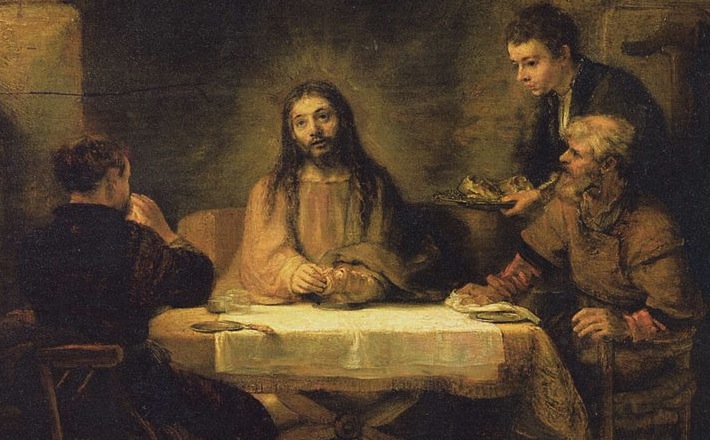Commentary on Psalm 116:1-4, 12-19
Like Psalm 118, Psalm 116 is a psalm of thanksgiving that is part of the Egyptian Hallel (see essay on Psalm 118:1-2, 14-24, Resurrection of Our Lord).
Typical elements of a thanksgiving psalm are present — expression of gratitude and/or trust (verses 1-2, 5-7, 10-11, 15-16), description of prior distress and deliverance (verses 3-4, 8-9), and the announcement of intent to offer sacrifice and/or make vows to God (verses 12-14, 17-19).
These elements are arranged in no apparent order, although it is noticeable that there is, according to Hossfeld and Zenger, a “saturation … with confessional expressions of trust.”1 More so than is the case with most psalms, it seems possible to identify an original life-setting for Psalm 116 — that is, the offering of a thanksgiving sacrifice (verses 13, 17) in the Temple (verse 19), accompanied by vows or promises (verses 14, 18; see CEB, “I’ll keep the promises I made to the LORD”).
Somewhat surprisingly, direct expressions of love for God, as in 116:1, are unusual in the Psalter (see elsewhere only 18:1, where the Hebrew verb differs). Robert Alter points out that the Hebrew syntax also permits the translation, “I love when the LORD hears,”2 but this would be quite unusual as well. In any case, verses 1-2 set the tone of trust that pervades the whole psalm.
References to Sheol (verse 3) are frequent in the Psalms. While Sheol is sometimes a place — the realm of the dead — to which even God has no access (see Psalm 6:5; 30:9; 88:3-7, 10-13), here Sheol seems more metaphorically to represent a deadly threat, in the midst of which God is able to help (see Psalms 30:3; 49:15; 56:13; 86:13).
And in this case, God has helped! The one threatened with death will live, as verses 8-9 make clear (see Psalm 118:17). The impact on the psalmist lasts a lifetime — “I will call on him as long as I live” (verse 2). In short, the psalmist’s love for God will be evident as he or she prays “without ceasing” (1 Thessalonians 5:17).
The psalmist’s prayerful existence is reinforced by the repetition of “call” in the final section of the psalm (verses 13, 17; see “call” also in verse 4 for a total of four occurrences — verses 2, 4, 13, 17). Verses 13 and 17 make it clear that prayer is not a passive or a private matter. In both verses 13 and 17, calling on the name of the LORD is accompanied by an action, and another public action is mentioned in the identical verses 14 and 18. The three actions are as follows:
“I will lift up the cup of salvation” (verse 13): As verse 12 has suggested, the psalmist’s actions are a way of giving back to God — not out of obligation, but rather out of gratitude. The psalmist has been “saved” (verse 6), so “the cup of salvation” is an appropriate response. Although it is not entirely clear, the cup is probably related to some sort of sacrificial offering — perhaps a drink offering (see Exodus 29:40; Numbers 28:7), or perhaps it was a cup raised (something like a toast?) in a celebratory meal. In this latter case, “the cup of salvation” could have been related to “a sacrifice of thanksgiving” (verse 17; see below).
“I will offer to you a thanksgiving sacrifice” (verse 17): This action is more clearly a liturgical response that would have taken place at the Temple. Thus, it would have had a public character, all the more so since portions of thanksgiving sacrifices (unlike whole burnt offerings) were eaten. Priests got a share, as did the worshiper who brought the sacrifice (and perhaps others whom the worshiper invited; see Leviticus 7:11-18). Thus, a thanksgiving sacrifice involved something like a communal meal (see above on “the cup of salvation”).
“I will pay my vows to the LORD” (verses 14, 18): This action may be related to the previous two (note that verses 14 and 18 follow immediately each of the two above actions) — that is, in the midst of earlier distress, the psalmist may have vowed or promised to thank God tangibly when he or she is delivered. If so, verses 14 and 18 affirm that the psalmist is keeping the promise. In any case, vows and their fulfillment are mentioned in other thanksgiving psalms as well (see Psalm 22:25, where a meal seems to take place in the next verse; 61:5, 8; 65:1).
Verses 15-16 are embedded in the series of verses that describe the psalmist’s three actions of gratitude. The NRSV of verse 15 is problematic, because it seems to suggest that God welcomes “the death of his faithful ones.” But just the opposite is true — that is, God wants the faithful to live, and God has acted to save the psalmist’s life.
Thus, the CEB is better: “The death of the LORD’s faithful is a costly loss in his eyes.” In response to God’s life-saving deliverance, the psalmist adopts a posture that coheres with the actions of gratitude — he or she will be God’s “servant.” The phrase “your servant” occurs twice (and in the Hebrew syntax, it occurs consecutively); the repetition and the syntax emphasize the point. True gratitude, and the actions that express it, ultimately take the form of servanthood.
If we contemporary faithful ones believe what we say we do — that is, that we are saved by grace — then we will hear Psalm 116 as an invitation to practice gratitude. We no longer bring animals to offer. Rather, we bring our whole selves, committed to God’s service (see Romans 12:1-2).
In a society that encourages us to be self-serving and all-deserving, gratitude and servanthood will take lots of practice. Like the ancient thanksgiving sacrifice, our practice involves a communal meal that we sometimes call the eucharist (=thanksgiving). Jesus told us to do it, and he is the host. Because no one deserves to be at Jesus’ table, all are welcome. This is pure grace, and to accept the invitation is an opportunity to practice true gratitude.
Notes:
1 Frank-Lothar Hossfeld and Erich Zenger, Psalms 3: A Commentary on Psalms 101-150 (Hermeneia; Minneapolis: Fortress Press, 2011), 215.
2 Robert Alter, The Book of Psalms: A Translation with Commentary (New York: W. W. Norton and Co., 2007), 411.


May 4, 2014